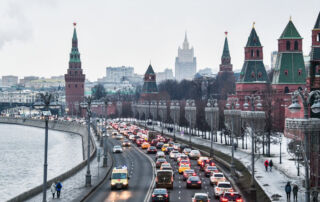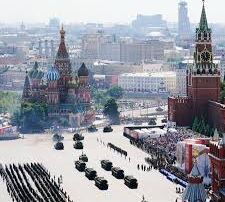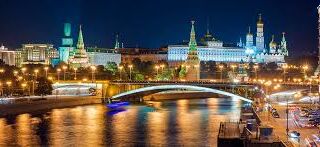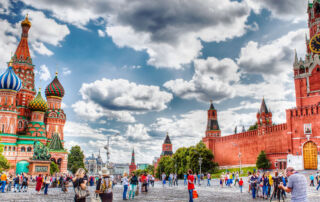Why Russia?
Russia is a highly educated country with over half of its residents holding a university degree. Russians have rich, centuries-old educational traditions. Russian universities provide their students with comfortable studying and living conditions and help them adapt to the country. Russian universities train a wide variety of specialists, both in engineering and the humanities, and regularly place in the top of international rankings. Education in Russia is much more affordable than in the USA or UK. Moreover, international students have the opportunity to study for free at the expense of the Government budget. Each year Russia accepts students from all over the world, from nearly 170 countries, and you can join them.
According to the Organisation for Economic Cooperation and Development (OECD), Russia has the most educated population in the world, outperforming Canada, Japan, Israel and the USA. More than half of Russians have higher education qualification. More than 270,000 people from 168 countries come to study at Russian universities.
General Information
Russian universities offer several types of education. Firstly, there is full-time attendance, when you need to be present at the university classes during the day. Secondly, there is the evening option, when you attend classes in weekday evenings and weekend days. Thirdly, you may choose part-time enrolment, where students listen to introductory lectures and subsequently study at home in accordance with a specially developed curriculum, and then come to the university to pass tests and exams. There are several levels of higher education: You can study in programme that award a Bachelor’s, Specialist, Master’s, or Postgraduate Degree as well as professional training programme or career advancement programme, or you can simply come to study Russian language.
Three kinds of higher education institutions in Russia
- Universities offer a broad range of programs on all levels.
- Academies place a larger emphasis on research and practical skills, normally dedicated to specific subject areas such as art, architecture or science.
- Institutes are independent branches of universities or academies which offer professional educational courses.
The higher education system in Russia is renowned for its achievements and emphasis in the field of science and technology. Many of the courses offered at state-funded institutions are focused around the sciences, but a large variety of humanities and social sciences programs are offered as well!
In recent years, private higher education institutions have emerged to complement these traditional Russian institutions, offering programs in other fields such as economics, business and law.
Degree Structures in the Russian Education System
While education in Russia is largely based on the Bologna principles, education in Russia structures degrees slightly differently than other countries in Europe.
- Upon completion of secondary education, students can pursue either a Bachelor’s or Specialist’s degree, both qualifying students to later pursue a master’s degree. Bachelor’s degrees are given after four years of full-time study at a university. Specialist degrees are awarded after a minimum of five years of study and are more focused on practical education in a student’s chosen field. Both qualifications require students to successfully defend a thesis and pass examinations. This degree is conferred in all fields except medicine, where the first stage of education lasts for six years.
- Master’s degrees are awarded after two years of study with one year dedicated to research which includes practice and preparation for a thesis defense.
- Students who possess a master’s degree are eligible to pursue their PhD studies. Postgraduate education is divided into two parts in Russia, and two degrees are required to confirm students’ status as a scientist. Postgraduate studies can only be pursued at a university or scientific institute. After successful completion of the first part of their postgraduate education, students are awarded a Candidate of Sciences degree.
- The final Doctoral degree is obtained after an additional 2-4 years of study in postgraduate education. This certification then leads to a Doctorate degree. As there is a 10-year gap between both degrees, the final Doctorate qualifications are often awarded to Candidates of Science after they’re well into their careers in academia.
Neither Bachelor’s or Master’s degrees existed in the Soviet system and were introduced to conform the Russian education system with international standards in accordance with the Bologna Process.
This change has helped Russian higher education qualifications receive recognition and acceptance abroad, which was a previous problem for international alumni, and explains the rising number of international students choosing Russia as their study abroad destination!
The Russian Academic Year
The academic year in Russia is split into two semesters. The first runs from September until January, and the second from February to June. This schedule is mandatory for all universities
Range of Tuition Fees in Russia
- A Bachelor’s degree in Russia can cost from RUB 220,000 to 240,000 (USD 3,385 to 3,690) per year;
- A Specialist’s degree can cost from RUB 220,00 to 240,000 (USD 3,385 to 3,690) per year;
- A Master’s degree can cost from RUB 240,000 to 260,000 (USD 3746 to USD 4058) up to RUB 450,000 (USD 8082) per year;
- Postgraduates course can cost anywhere from RUB 72,000 (USD 1293) to 250,000 (USD 4490) per year
Other Living Costs
Like in other countries, the cost of living in Russia will largely depend on your location and lifestyle. Like accommodation costs, prices in Moscow and St. Petersburg can vary highly in comparison with other cities in Russia.
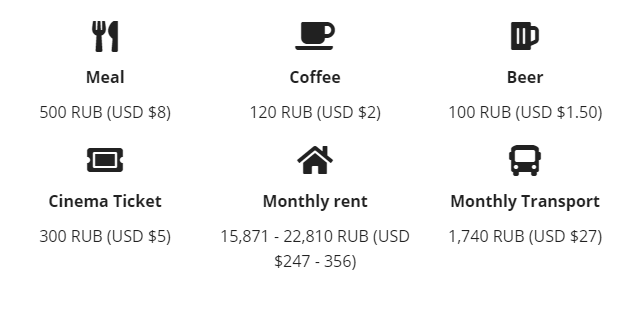
Quick facts & figures
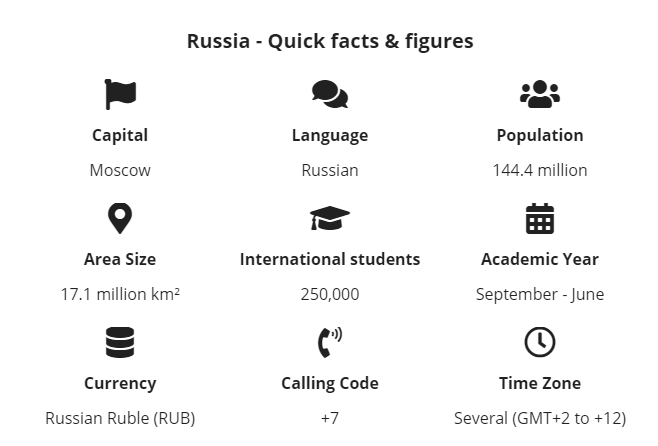
Blog
Comparing MBBS in Abroad and MBBS in India
Overview:Comparing MBBS in Abroad and MBBS in IndiaUnlike the popular ...
MBBS in Russian Medical University
Overview: Now, is the time when you are probably ...
Important Checkpoints before Admission in Any Abroad Medical University
Overview: We understand opting for MBBS abroad and going ...

